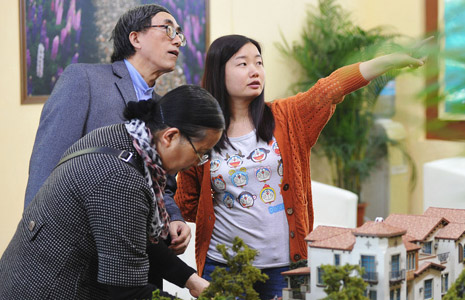Driven from the lap of luxury
Updated: 2014-08-15 10:18
By Zeng Zhiling(China Daily Europe)
|
|||||||||||
China's antitrust probe is likely to hit high-end foreign brands the hardest
China's antitrust regulators recently took high-profile action against a number of global companies such as Mercedes-Benz, Audi and Chrysler for monopoly practices. The investigation was expanded to 12 Japanese auto parts suppliers.
The firms in question have been accused of making extraordinary profits by dominating the retail market, overcharging car buyers and plotting to control the price of spare parts.
As a reaction to the investigation, Mercedes-Benz, Audi, BMW and other original equipment manufacturers announced price cuts on spare parts as well as on a number of high-end import models.
Imported luxury cars in China can cost three to four times as much as in the United States, with automakers arguing that the bulk of the difference is a result of taxes. However, when Tesla Motors revealed its pricing policy in China, which demonstrated minimal markups for its models, this argument soon became untenable.
With a price tag of 734,000 yuan ($119,000, 89,000 euros), the price of a Tesla Model S in China is essentially the same as its price in the US with the addition of taxes and transport costs. Tesla made the following statement in relation to its pricing strategy for the Model S: "734k CNY (yuan) is a big risk for Tesla. We know it's unconventional. We know we could charge more. We know that our competitors will try to convince Chinese consumers that our relatively lower price tag means the Model S is a lesser car, when the real reason their car costs more is that they make double the profit per car in China compared to the United States or Europe."
The question then is why foreign carmakers in China are able to charge so much more for imported cars and parts. The following two points may shed some light on the matter:
First, regulations relating to vehicle distribution (Measures for the Implementation of the Sales Management by Automobile Brands, referred to as "the measures") were promulgated in 2005, three years earlier than China's antitrust law. The measures have been highly controversial in the industry because foreign carmakers were able to secure exclusive import rights by setting up fully owned companies for the purposes of general sales. Manufacturers of imported cars, therefore, have had full control of distribution channels, including pricing strategies and after-sales service.
Furthermore, since 2008, every import car manufacturer importing vehicles into China has had to report the vehicle identification numbers of the imports to Chinese customs. Consequently, any car with a VIN that has not been properly recorded is banned from sale. This has in effect deprived small, domestic imported-car dealers of business.
Second, the rising demand for luxury cars also contributes to the price differential. China has been a key market for luxury carmakers, thanks to the fast-growing number of new, rich, young entrepreneurs. For instance, it is common practice for Chinese luxury car buyers to pay an extra premium (which may amount to as much as 25 percent of the manufacturer's suggested retail price) if they want to buy a popular luxury model reasonably quickly. This lack of balance in the supply/demand relationship undoubtedly plays a part in pushing the price of luxury cars sky high.
So, will the latest antitrust swoop be a game-changer? The answer is probably yes.
On Aug 1, the China State Administration of Industry and Commerce announced a new policy to regulate the distribution of imported vehicles into China. This new policy creates enormous opportunities for car dealers by freeing them up to sell any brand of imported car. Previously, car dealers could only sell one authorized brand per dealer store. In light of this policy change, the need to revise the measures of 2005 has become inevitable.
Inspired by the new policy, some domestic car dealers have taken action. China Auto Logistics Inc., a NASDAQ-listed luxury car dealer, recently signed an agreement with a leasing company to develop a chain of auto malls to distribute multiple brands of cars in China.
In early April, the Shanghai Free Trade Zone submitted its application to start a trial of parallel imports. By establishing a parallel imports car market in the zone, domestic dealers will be able to import cars directly without any need to obtain authorization from the original manufacturer. At the moment, the Ministry of Commerce is reviewing the application, but the antitrust investigation is likely to increase the chances of the application being approved.
Who will be affected? We think luxury carmakers with a focus on the high-end segment will feel the impact most keenly.
The mainstream car market in China has been particularly crowded, with more than 90 brands and 400 models competing last year. In contrast, in the US, there are fewer than 40 brands and only 260 models. Prices in that segment are relatively fair if you compare prices in China and the US. For instance, retail prices of mini and subcompact cars in China are generally lower than those in the US.
Only high-end luxury cars with a price tag exceeding 1 million yuan are likely to feel any competitive pressure under the new regulations.
The author is managing director at LMC automotive consulting (Shanghai) Co Ltd.
(China Daily European Weekly 08/15/2014 page9)
Today's Top News
British Chinese call for memorial to WWI workers
Pollution control set as priority for APEC meeting
Swimmer nabs silver at Gay Games in the US
China exports to Russia to surge
Chinese economic crime suspects repatriated
Ukraine deaths double in 2 weeks
Sensitive times in the making
Chinese film fans mourn for star
Hot Topics
Lunar probe , China growth forecasts, Emission rules get tougher, China seen through 'colored lens', International board,
Editor's Picks

|

|

|

|

|

|





